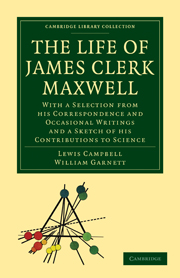 The Life of James Clerk Maxwell
The Life of James Clerk Maxwell Book contents
- Frontmatter
- PREFACE
- Contents
- LIST OF ILLUSTRATIONS
- PART I BIOGRAPHICAL OUTLINE
- CHAPTER I BIRTH AND PARENTAGE
- Note.—The Clerks of Penicuik and Maxwells of Middlebie
- CHAPTER II GLENLAIR—CHILDHOOD—1831-1841
- CHAPTER III BOYHOOD—1841-1844
- CHAPTER IV ADOLESCENCE—1844-1847
- Note.—Oval and Meloid
- CHAPTER V OPENING MANHOOD—1847-1850
- CHAPTER VI UNDERGRADUATE LIFE AT CAMBRIDGE—1850-1854
- CHAPTER VII BACHELOR-SCHOLAR AND FELLOW OF TRINITY—1854-1856
- CHAPTER VIII ESSAYS AT CAMBRIDGE—1853-1856
- CHAPTER IX DEATH OF HIS FATHER—PROFESSORSHIP AT ABERDEEN—1856-1857
- CHAPTER X ABERDEEN—MARRIAGE—1857-1860
- CHAPTER XI KING'S COLLEGE, LONDON—GLENLAIR—1860-1870
- CHAPTER XII CAMBRIDGE—1871-1879
- CHAPTER XIII ILLNESS AND DEATH—1879
- CHAPTER XIV LAST ESSAYS AT CAMBRIDGE
- PART II CONTRIBUTIONS TO SCIENCE
- PART III POEMS
- INDEX
- Plate section
CHAPTER V - OPENING MANHOOD—1847-1850
Published online by Cambridge University Press: 05 July 2011
- Frontmatter
- PREFACE
- Contents
- LIST OF ILLUSTRATIONS
- PART I BIOGRAPHICAL OUTLINE
- CHAPTER I BIRTH AND PARENTAGE
- Note.—The Clerks of Penicuik and Maxwells of Middlebie
- CHAPTER II GLENLAIR—CHILDHOOD—1831-1841
- CHAPTER III BOYHOOD—1841-1844
- CHAPTER IV ADOLESCENCE—1844-1847
- Note.—Oval and Meloid
- CHAPTER V OPENING MANHOOD—1847-1850
- CHAPTER VI UNDERGRADUATE LIFE AT CAMBRIDGE—1850-1854
- CHAPTER VII BACHELOR-SCHOLAR AND FELLOW OF TRINITY—1854-1856
- CHAPTER VIII ESSAYS AT CAMBRIDGE—1853-1856
- CHAPTER IX DEATH OF HIS FATHER—PROFESSORSHIP AT ABERDEEN—1856-1857
- CHAPTER X ABERDEEN—MARRIAGE—1857-1860
- CHAPTER XI KING'S COLLEGE, LONDON—GLENLAIR—1860-1870
- CHAPTER XII CAMBRIDGE—1871-1879
- CHAPTER XIII ILLNESS AND DEATH—1879
- CHAPTER XIV LAST ESSAYS AT CAMBRIDGE
- PART II CONTRIBUTIONS TO SCIENCE
- PART III POEMS
- INDEX
- Plate section
Summary
When he entered the University of Edinburgh, James Clerk Maxwell still occasioned some concern to the more conventional amongst his friends by the originality and simplicity of his ways. His replies in ordinary conversation were indirect and enigmatical, often uttered with hesitation and in a monotonous key. While extremely neat in his person, he had a rooted objection to the vanities of starch and gloves. He had a pious horror of destroying anything—even a scrap of writing paper. He preferred travelling by the third class in railway journeys, saying he liked a hard seat. When at table he often seemed abstracted from what was going on, being absorbed in observing the effects of refracted light in the finger-glasses, or in trying some experiment with his eyes—seeing round a corner, making invisible stereoscopes, and the like. Miss Cay used to call his attention by crying, “Jamsie, you're in a prop.” He never tasted wine; and he spoke to gentle and simple in exactly the same tone. On the other hand, his teachers—Forbes above all—had formed the highest opinion of his intellectual originality and force; and a few experienced observers, in watching his devotion to his father, began to have some inkling of his heroic singleness of heart. To his college companions, whom he could now select at will, his quaint humour was an endless delight. His chief associates, after I went to the University of Glasgow, were my brother, Robert Campbell (still at the Academy), P. G. Tait, and Allan Stewart.
- Type
- Chapter
- Information
- The Life of James Clerk MaxwellWith a Selection from his Correspondence and Occasional Writings and a Sketch of his Contributions to Science, pp. 105 - 145Publisher: Cambridge University PressPrint publication year: 2010First published in: 1882


